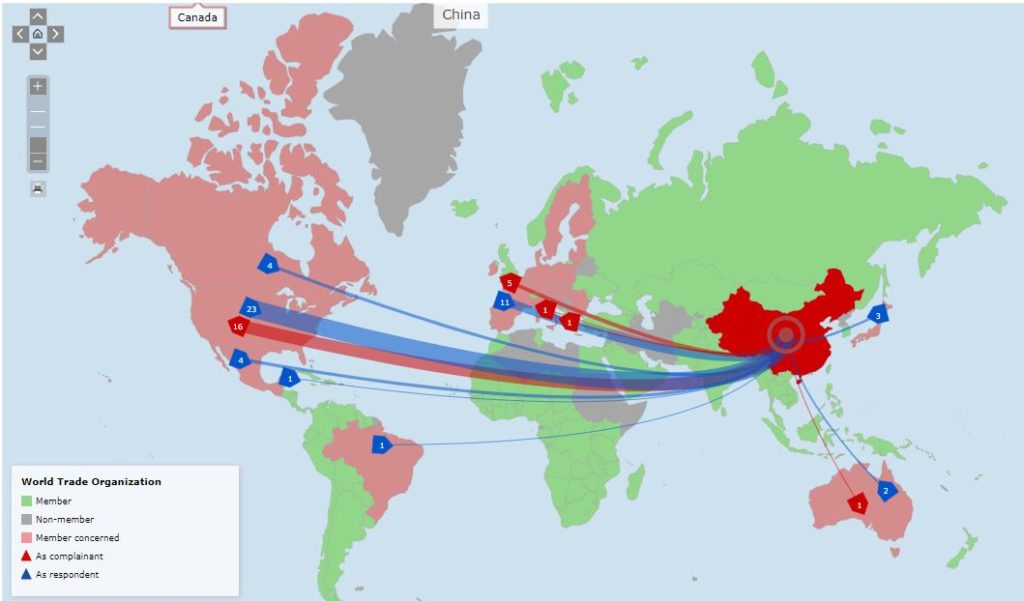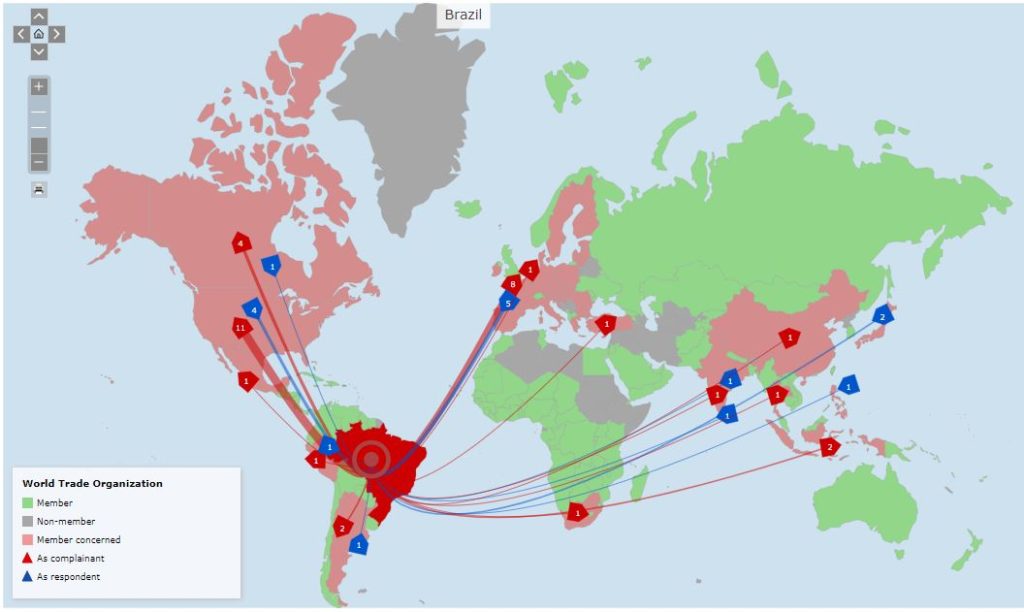Global Sanctions: A Bibliography from the Graduate Institute
I. PAPERS, CHAPTERS, REPORTS and NEWS ARTICLES
The EU, Sanctions and Regional Leadership
Paul James Cardwell and Erica Moret, in European Security (2022), https://repository.graduateinstitute.ch/record/300563?ln=en.
The Hidden Toll of Sanctions: Why Washington Must Reckon with the Devastating Inflation Its Policies Cause
Esfandyar Batmanghelidj and Erica Moret, in Foreign Affairs, 17 January 2022, https://www.foreignaffairs.com/articles/world/2022-01-17/hidden-toll-sanctions.
Life and Death: NGO Access to Financial Services in Afghanistan
Erica Moret (Oslo: Norwegian Refugee Council, 2022), https://repository.graduateinstitute.ch/record/299828.
Sanctions and the Costs of Russia’s War in Ukraine
Erica Moret, in Global Observatory, 12 May 2022, https://theglobalobservatory.org/2022/05/sanctions-and-the-costs-of-russias-war-in-ukraine/.
Sanctions and Their Impact on Children
Zoë Pelter, Camila Teixeira and Erica Moret, discussion paper (New York: United Nations Children’s Fund, Office of Global Insight and Policy, 2022), https://repository.graduateinstitute.ch/record/299852.
Sleeping beside the Elephant: The United States in Canada’s Middle East Policy
Farzan Sabet, in Middle Power in the Middle East: Canada’s Foreign and Defence Policies in a Changing Region, ed. Thomas Juneau and Bessma Momani (Toronto: University of Toronto Press, 2022), 14–30.
Viral Governance: How Unilateral US Sanctions Changed the Rules of Financial Capitalism
Grégoire Mallard and Jin Sun, in American Journal of Sociology 128, no. 1 (2022): 144–188, http://dx.doi.org/10.1086/719925.
What is the Role of Financial Sanctions in Tackling Modern Slavery and Human Trafficking?
Erica Moret, report (New York: United Nations University, 2022), https://repository.graduateinstitute.ch/record/300583?ln=en.
Compliance and Enforcement
Grégoire Mallard and Farzan Sabet, in From the Iran Nuclear Deal to a Middle East Zone? Lessons from the JCPOA for an ME WMDFZ, ed. Chen Zak and Farzan Sabet (Geneva: UNIDIR, 2021), 69–82, https://repository.graduateinstitute.ch/record/299553.
Embedded Extra-Territoriality: US Judicial Litigation and the Global Banking Surveillance of Digital Money Flows
Grégoire Mallard and Anna Hanson, in The Research Handbook on Unilateral and Extraterritorial Sanctions, ed. Charlotte Beaucillon (Cheltenham, UK: Edward Elgar Publishing, 2021), 270–87, https://repository.graduateinstitute.ch/record/299410.
International Bank Settlement in China and Unilateral Sanctions-Related Disputes: Sources, Remedies and Procedures
Jin Sun, in The Research Handbook on Unilateral and Extraterritorial Sanctions, ed. Charlotte Beaucillon (Cheltenham, UK: Edward Elgar Publishing, 2021), 323–41, https://repository.graduateinstitute.ch/record/299409.
Sanctioned Countries in the Global COVID-19 Vaccination Campaign: The Forgotten 70%
Karl Blanchet, Grégoire Mallard, Erica Moret and Jin Sun, in Conflict and Health 15, art. no. 69 (2021), https://repository.graduateinstitute.ch/record/299411.
Sanctions on Afghanistan: Why Less Is More
Erica Moret and Karl Blanchet, in The New Humanitarian, 30 September 2021, https://www.thenewhumanitarian.org/opinion/2021/9/30/sanctions-on-afghanistan-why-less-is-more.
Sanctions Relaxation and Conflict Resolution: Lessons from Past Sanctions Regimes
Zuzana Hudáková, Thomas Biersteker and Erica Moret (Atlanta, GA: The Carter Center, 2021), https://repository.graduateinstitute.ch/record/299408.
Le souci des populations sous sanctions: un défi pour la gouvernance de la santé mondiale à l’ère du coronavirus
Grégoire Mallard, Jin Sun et Erica Moret, in Savoir/Agir 2021/2, no. 56: 21–27, https://doi.org/10.3917/sava.056.0023.
Targeting Bad Apples or the Whole Barrel? The Legal Entanglements between Targeted and Comprehensive Logics in Counter-Proliferation Sanctions
Grégoire Mallard and Aurel Niederberger, in Entangled Legalities beyond the State, ed. Nico Krisch (Cambridge: Cambridge University Press, 2021), 229–59, https://doi.org/10.1017/9781108914642.013.
The Humanitarian Gap in the Global Sanctions Regime: Assessing Causes, Effects and Solutions
Grégoire Mallard, Farzan Sabet and Jin Sun, in Global Governance: A Review of Multilateralism and International Organizations 26, no. 1 (2020): 121–153, https://doi.org/10.1163/19426720-02601003.
This article received the International Geneva Award for best article from SNIS in 2020.
Understanding Effectiveness of International Sanctions [in Russian]
Thomas J. Biersteker, in MGIMO Review of International Relations, no. 3(66) (2019): 7–16, http://dx.doi.org/10.24833/2071-8160-2019-3-66-7-16.
Sanctions after Brexit
Erica Moret and Fabrice Pothier, in Survival: Global Politics and Strategy 60, no. 2 (April–May 2018): 179–200. https://doi.org/10.1080/00396338.2018.1448585.
UN Targeted Sanctions Datasets (1991–2013)
Thomas J. Biersteker, Sue E. Eckert, Marcos Tourinho et al., in Journal of Peace Research 55, no. 3 (2018): 404–412, https://doi.org/10.1177/0022343317752539.
The Art of Sanctions
Thomas J. Biersteker, in The Brown Journal of World Affairs 19, no. 2 (2013): 11–17, https://www.jstor.org/stable/24590815.
Targeted Sanctions and Individual Human Rights
Thomas J. Biersteker, in International Journal 65, no. 1 (2009–2010): 99–117, https://www.jstor.org/stable/25681088.
II. BOOKS
Global Economic Consequences of the War in Ukraine: Sanctions, Supply Chains and Sustainability
Luis Garicano, Dominic Rohner and Beatrice Weder di Mauro, ed. (London: CEPR Press, 2022), https://repository.graduateinstitute.ch/record/300346.
Targeted Sanctions: The Impacts and Effectiveness of United Nations Action
Thomas J. Biersteker, Sue E. Eckert and Marcos Tourinho, ed. (Cambridge, Cambridge University Press, 2016), https://doi.org/10.1017/CBO9781316460290.
Les sanctions des Nations Unies et leurs effets secondaires: assistance aux victimes et voies juridiques de prévention
Djacoba Liva Tehindrazanarivelo (Paris: Presses Universitaires de France, 2005; republié en 2014: Genève: Graduate Institute Publications), https://doi.org/10.4000/books.iheid.1508.
National Implementation of United Nations Sanctions: A Comparative Study
Vera Gowlland-Debbas, ed. (Leiden: Martinus Nijhoff, 2004).
III. PHD THESES
The UNSEEN: Expert Networks and Knowledge Practices in the Monitoring of UN Sanctions
Aurel Niederberger (Graduate Institute of International and Development Studies, 2017), https://repository.graduateinstitute.ch/record/295332.
The Ties That Bind: A Socio-Relational Approach to the Dilemmas of Human Rights Sanctions against Friendly States
Rachelle Marie Céline Cloutier (Graduate Institute of International and Development Studies, 2013), https://repository.graduateinstitute.ch/record/288562.
Les effets secondaires des sanctions non militaires des Nations Unies: aspects juridiques et influence sur le nouveau concept de sanction de l’ONU
Djacoba Andry Solofonirina Oliva Tehindrazanarivelo (Institut universitaire de hautes études internationales, 2003), disponible à la bibliothèque de l’Institut.
American Sanctions against the Soviet Union: The Experience from Nixon to Reagan
Donald Glenn Boudreau (Geneva, s.n., 1989), available at the Graduate Institute’s library
The Actions of the States Members of the League of Nations in Application of Sanctions against Italy, 1935/1936
Albert E. Highley (s.l., s.n., 1938), available at the Graduate Institute’s library.
IV. ONGOING RESEARCH PROJECTS
Targeted Sanctions Initiative
The Targeted Sanctions Initiative at the Geneva Graduate Institute is a locus for scholarly and policy research on targeted sanctions. Headed by Thomas Biersteker, the initiative involves the maintenance of qualitative and quantitative databases on UN targeted sanctions, the software SanctionsApp and a regular seminar series held in Geneva.
More info
Bombs, Banks and Sanctions
This ERC project led by Grégoire Mallard assesses how the private sector is involved in the formulation of policies to ensure greater financial transparency, which is, in turn, transforming the field of international law, where policymaking has been traditionally reserved for institutions within the public sector.
More info
When Money Can’t Buy Food and Medicine: Banking Challenges in the International Trade of Vital Goods and Their Humanitarian Impact in Sanctioned Jurisdictions
Led by Erica Moret and funded by the Swiss Network for International Studies (SNIS), this project conducts an empirical study comparing the risk mitigation strategies used by non-state actors involved in the delivery of food and medicine to heavily sanctioned jurisdictions such as Iran, North Korea, Venezuela and Syria.
More info
VIDEO: A critical analysis of the weaponisation of economics, by Beatrice Weder di Mauro
Research Office, Geneva Graduate Institute.
VIDEO: Why integrated trade networks matter, with Richard Baldwin
VOXeu and CEPR (Geneva Graduate Institute)
PODCAST: Are we moving towards a new economic cold war? with Cédric Dupont
Research Office, Geneva Graduate Institute. Globalchallenges.ch
PODCAST: Economic nationalism in the light of the long-term history of capitalism, with Gopalan Balachandran
Research Office, Geneva Graduate Institute. Globalchallenges.ch
PODCAST: Overview of the WTO challenges in 2022, with Manuel Miranda
Research Office, Geneva Graduate Institute, 2022. Globalchallenges.org
PODCAST: China and the changing global economic landscape, with Sung Min Rho
Research Office, Geneva Graduate Institute. Globalchallenges.ch
PODCAST: The Economic Weapon in Global Governance, with Nicholas Mulder
Geneva Graduate Institute
DEFINITIONS related to sanctions and economic warfare
Economic and financial sanctions are enforcement actions taken by a country or a group of countries against a targeted state, group, or individual that has been found in non-compliance with existing international law, treaty obligations and customary rules. They can take many forms, like restrictions on commercial or financial transactions, asset freezes, travel bans, or the withholding of economic and technical assistance. They pursue a variety of social, commercial and/or political objectives depending on the kind of violations committed by the target group or state. Usually, they are supposed to coerce targets of sanctions into compliant behaviour, but often, they serve to deter third countries from pursuing similar violations of international law commitments. As an enforcement action, sanctions are supposed to refer to a specific violation of existing law, rather than constitute a purely political measure.
An embargo is the partial or complete proscription of commerce with a particular country or a group of countries. It entails the ban of imports or exports of certain items, or whole sectors, or all products from or to a specified country. One of the most famous illustrations is the oil embargo imposed by the Organization of the Petroleum Exporting Countries (OPEC) in 1973 in retaliation to Western support for Israel during the Yom Kippur War. As a barrier to trade, an embargo should not be confused with a military blockade, although enforcement of the embargo could escalate into a military intervention. In contrast to sanctions, which are conceived as enforcement actions, an alliance of states can decide to erect an embargo based on political reasons, for instance, to help allies involved in a conflict by weakening the economy of inimical states.
Sanctions have been used to advance a range of foreign policy goals, including counterterrorism, counternarcotics, nonproliferation, democracy and human rights promotion, conflict resolution, and cybersecurity. Sanctions, while a form of intervention, are generally viewed as a lower-cost, lower-risk course of action between diplomacy and war. Still, the costs of sanctions are harder to measure, and human costs can be very high, especially when a whole economy is sanctioned, as in the case of “comprehensive sanctions” against Iraq in the 1990s, or when the whole financial system of a country is crippled, as in the case of “massified” targeted financial sanctions against Iran in the early 2010s.
As the UN’s principal crisis-management body, the Security Council (UNSC) may respond to global threats by imposing sanctions against states and nonstate groups who are found in non-compliance of international law. Sanctions resolutions must pass the fifteen-member council by a majority vote and without a veto from any of the five permanent members: the United States, China, France, Russia, and the United Kingdom. The most common types of UN sanctions, which are binding for all member states, are asset freezes, travel bans, and arms embargoes. UN sanctions regimes are typically managed by a special committee and a monitoring group. The global police agency INTERPOL assists some sanctions committees, but the UN has no independent means of enforcement and relies on member states, many of which have limited resources and little political incentive to prosecute noncompliance. Still, the private sector, and especially banking institutions, have come to integrate the names of front companies found in the reports of UN monitoring groups that document evasion practices of specific UNSC sanction regimes, which demonstrates the centrality attained by the UNSC in the management of sanctions. Prior to 1990, the UNSC had imposed sanctions against just two states: Southern Rhodesia (1966) and South Africa (1977), but there has been a long history of sanctions by the League of Nations, of which the UN is the successor organisation.
The European Union imposes sanctions, known more commonly in the 28-member bloc as “restrictive measures”, as part of its Common Foreign and Security Policy. Because the EU lacks a joint military force, many European leaders consider sanctions the bloc’s most powerful foreign policy tool, based on the experience attained during the early 2010s in the nuclear negotiation with Iran that lead to the signature of the JCPOA in 2015. Sanctions policies must receive unanimous consent from member states in the Council of the European Union, the body that represents EU leaders. Since its inception in 1992, the EU has levied sanctions more than 30 times (in addition to those mandated by the UN). Analysts say the “massified” targeted sanctions the EU bloc imposed on Iran in 2012 – which it lifted in 2015 as part of the Iran nuclear agreement (the Joint Comprehensive Plan of Action, JCPOA) – marked a turning point for the EU, which had previously sought to limit sanctions to specific individuals or companies.
The United States uses economic and financial sanctions more than any other country. Sanctions policy may originate in either the executive or legislative branch. Presidents typically launch the process by issuing an executive order (EO) that declares a national emergency in response to an “unusual and extraordinary” foreign threat, for example, “the proliferation of nuclear, biological, and chemical weapons” (EO 12938) or “the actions and policies of the Government of the Russian Federation with respect to Ukraine” (EO 13661). Many US sanctions regimes are administered by the Office of Foreign Assets Control (OFAC), located in the Department of the Treasury: OFAC is often considered an all-powerful organisation, as it is in charge of sanctions designations, sanctions exemptions and humanitarian licenses, and examination of delisting requests.
Economic nationalism is an ideology that advocates bolstering and protecting national economies in an effort to countenance or counteract the effects of trade liberalisation and globalisation. It aims to maximise national self-reliance by reverting to elements of protectionism and mercantilism. Economic nationalism privileges state control and interventionism over market mechanisms, profit maximisation and growth. It typically restricts flows of labour, capital, goods and services through protectionist measures such as tariffs, investment controls or export restrictions.
Reshoring is the opposite of offshoring. It refers to companies repatriating “back home” parts or all of their supply chains components, including back-office, manufacturing, or R&D processes. Nearshoring and friendshoring obey a logic similar to reshoring, but instead of production and manufacturing being repatriated back to the “home country”, they are relocated to neighbouring (nearshoring) or allied countries (friendshoring).
Research Office, Geneva Graduated Institute. Questions largely inspired by the Council on Foreign Relations, www.cfr.org.
















